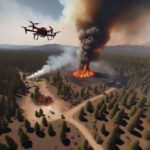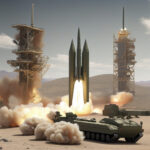In a significant move to shape the future of military technology, South Korea recently convened an international summit focused on Artificial Intelligence (AI) in warfare. This event, held in Seoul over two days and attended by representatives from more than 90 countries, including major powers such as the United States and China, aimed to establish guidelines for the responsible use of AI in military applications.
The summit was characterized by a commitment to developing a non-binding blueprint for the responsible use of AI, reflecting a growing recognition among nations that these technologies must be monitored and regulated to prevent misuse. Although the agreement reached is not expected to impose legally binding commitments, it is a step toward international cooperation in this critical area.
South Korean Defense Minister Kim Yong-hyun emphasized the transformative potential of AI in modern warfare while acknowledging its inherent risks. He noted that AI technologies, such as drones deployed in the ongoing conflict in Ukraine, symbolize the dual-use nature of these systems. They can significantly enhance military capabilities but simultaneously pose considerable threats if misused or unchecked. This duality was a focal point of discussions, navigating the delicate balance between advancing technology and ensuring ethical considerations in military decisions.
Furthermore, South Korea’s Foreign Minister Cho Tae-yul highlighted the urgent need for international safeguards. He advocated for mechanisms that would prevent autonomous weapons from making lethal decisions independently, stressing that human oversight is crucial. This perspective aligns with a growing consensus among various stakeholders on the necessity of maintaining human control, particularly in life-and-death situations.
The summit sought to lay out principles borrowing from established guidelines set by NATO and various national governments, aiming to create a common framework for the responsible integration of AI in military operations. The proposed guidelines would not only delineate usage standards but also offer minimum safeguard measures designed to mitigate the risks associated with autonomous weapons.
Involvement from a diverse range of countries signifies the global importance of this discussion. While the groundwork established at the summit represents a firm step towards a comprehensive approach to AI in warfare, the nuances of reaching an agreement among different nations cannot be ignored. Each country brings its own perspectives, goals, and apprehensions, which could lead to divergent views on acceptable AI applications in military settings.
Parallel to the summit, ongoing discussions regarding AI’s role in warfare are being explored internationally. The United Nations is currently evaluating potential restrictions on lethal autonomous weapons through the 1983 Convention on Certain Conventional Weapons (CCW). Additionally, the U.S. government has taken a leading position, advocating for responsible uses of AI in military contexts, with 55 nations already endorsing its declaration.
The summit, co-hosted by the Netherlands, Singapore, Kenya, and the United Kingdom, was an assembly of around 2,000 participants, including representatives from international organizations, academia, and the private sector. Dialogues ranged widely from civilian protection to the implications of AI in managing nuclear arsenals.
This international discourse is essential in addressing the unprecedented speed at which AI technologies are advancing. As governments weigh the remarkable capabilities and ethical implications of these tools, the challenge remains to craft policies that uphold safety and security without stifling innovation.
The discussions held in Seoul signal a crucial shift in the military landscape, one in which collaboration and dialogue are key to navigating the complexities introduced by AI. The outcomes of such dialogues will likely inform future military strategies and international relationships, emphasizing the necessity of ongoing collaboration as technology continues to evolve.
As nations come together to grapple with these pressing issues, the need for responsible innovation and the establishment of rigorous standards becomes increasingly paramount. It is clear that the global community cannot afford to overlook the implications of AI in warfare, and this summit represents a critical juncture in the journey towards accountable use of advanced technologies in military operations.












